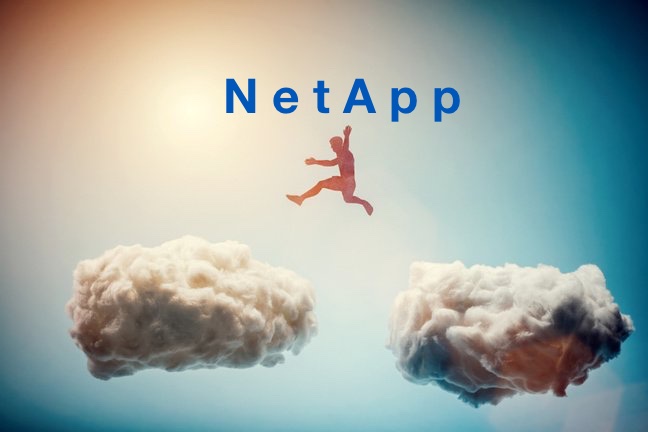NetApp has collaborated with VMware to integrate its Google Cloud Platform ONTAP-based Cloud Volumes Service with the Google Cloud VMware Engine and announced an Advance storage marketing program with controller upgrades.
Google Cloud VMware Engine can use the fully managed Cloud Volumes Service as a datastore, enabling on-premises VMs, using ONTAP as an external datastore, to be moved to GCP (or AWS or Azure) and get the same data management and performance facilities.
Eric Han, VP of Product Management for NetApp’s cloud portfolio, said: “NetApp is the first cloud storage service provider certified and supported as an external datastore for VMware on Google Cloud.” There are some 20,000 joint VMware-NetApp customers who can make use of this.
Manoj Sharma, director of Google Cloud VMware Engine Product Management, said: “Using NetApp Cloud Volumes Service datastores for Google Cloud VMware Engine reduces operational overhead and lowers the cost of migrating and managing VMware applications. Customers can extend their existing investments in VMware – using the same tools and processes – while enhancing agility, security, and availability.”
NetApp’s Phil Brotherton told Blocks & Files that the big story here is that NetApp is now enabling VMware customers to have unprecedented flexibility to move their workloads across any of the three major cloud providers or on-prem with ONTAP via the integration of Amazon FSx for NetApp ONTAP with VMC for AWS being announced at VMware Explore (US) in late August, and Azure NetApp Files integrating with Azure VMware Service announced at VMware Explore Barcelona in October last year. NetApp is completing the trifecta with Google now.
We understand that VMware approached NetApp with this customer need to more simply move large, data-rich VM workloads to the clouds. VMware themselves have led the engineering of FSx for NetApp ONTAP integration with VMC.
VMware’s own Cloud Flex is for AWS migrations specifically.
NetApp says its Cloud Volumes Service can scale storage independently of compute in the cloud, avoiding the need to provision more compute nodes just to get more storage capacity.
Advancements
The company’s Advance program has three elements: a Storage Lifecycle Program, Cloud Advantage Program, and storage efficiency guarantee. The Storage Lifecycle Program enables ongoing, non-disruptive hardware upgrades of NetApp arrays so avoiding the traditional refresh cycles. Customers can choose on-premises or cloud storage upgrade options to scale “securely, seamlessly, and non-disruptively as they grow.” The Cloud Advantage Program provides the cloud storage option.
There are five component features in the lifecycle program:
- No additional cost non-disruptive upgrades to the latest storage controller technology every three, four or five years
- Option to upgrade controllers at only incremental cost prior to three-year renewal
- Optional capacity refresh allowing customers to replace lower capacity drives as part of a storage refresh, so customers never have to buy the same capacity twice
- Remotely managed software updates including non-disruptive ONTAP software upgrades
- Premier-level support services, with Active IQ and Cloud Insights that enable full-stack visibility and AIOps. ONTAP Essentials provides detailed overviews of ONTAP inventories, workloads, and data protection
The upgrade part of this is roughly similar to Pure’s original Evergreen/Forever Flash program back in 2015. B&F asked NetApp how it would position its NetApp Storage Lifecycle Program in relation to Pure’s Evergreen program.
CMO Gabie Boko told us: “NetApp stands alone in offering hybrid multicloud flexibility and all the solutions within the Storage Lifecycle Program are indicative of that. NetApp Advance’s Cloud Advantage, part of the Storage Lifecycle Program, allows customers the ability to exchange controllers from their on-premises investment for cloud transfer credits toward NetApp cloud solutions across any of the major public clouds. NetApp Advance helps eliminate tech refresh challenges, guarantees efficiency, and unlike other storage providers, NetApp provides a path to the cloud when customers want or are ready.”
Back in 2019, Pure’s Evergreen Storage Service (ES2 and now called Pure-as-a-Service) was a unified subscription model across hybrid environments: on-premises, hosted and in the public cloud. It allowed customers to move all or any portion of their pay-per-use block storage capacity between environments without any adjustments to their contract. Pure’s Cloud Block Store supports AWS and Azure. NetApp’s Advance supports AWS, Azure and GCP.
Storage Advance is a 4:1 SAN storage efficiency guarantee available for all AFF all-flash systems. It says that if workload efficiency goals are not met, NetApp will rectify this at no cost to the customer.
VAST Data has a Zero Compromise guarantee which includes best-in-class data reduction. If a VAST storage system does not deliver the best storage efficiency, the company will provide additional storage to cover the difference at no additional cost.
Pure Storage has a right-size guarantee, first introduced in 2016, with which customers tell Pure how much capacity they need for their applications, and Pure provides an array with that amount of effective (after data reduction) capacity. If a customer’s FlashArray does not deliver on the promised effective capacity as they migrate their data over the six-month period of the guarantee, Pure will make it right by providing free additional flash, as needed, to meet the written guarantee.
Comment
Now that NetApp has its Blue XP-managed ONTAP data fabric covering the on-premises, AWS, Azure and GCP storage environments and is promoting the idea of VM migration between them, it may need to provide data migration facilities between these environments.
That will require storage system metadata, a data mover and pipeline management. Cloud File services suppliers, such as CTERA, Egnyte, Hammerspace, Lucid Link, Nasuni and Panzura all have metadata management capabilities that are relevant. Data migrators such as Cirrus Data, Datadobi, Data Dynamics and WANdisco have data movers and pipeline handlers that are also relevant.
We think that all storage system suppliers adopting a common on-premises and public cloud environment will be encouraged by their customers to provide improved data movement capabilities.








